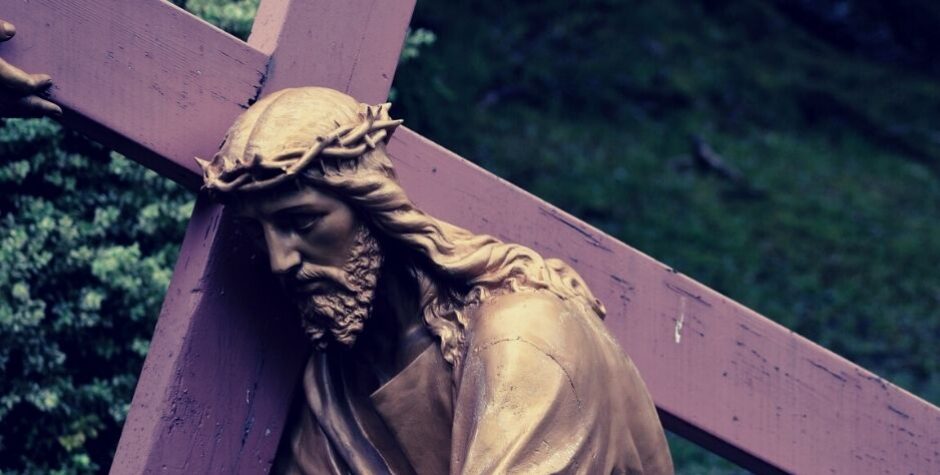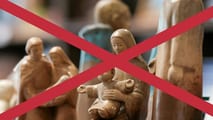

The Persecution of Apostates and Converts of Islam in France: Testimonies
The Persecution of Converts in France
Excerpts from the book Ils ont choisi le Christ. Ces convertis de l’Islam dont on ne parle pas by Jean-François Chemain (Artège, 2019).
In July 2012, the media discreetly echoed a drama that occurred in Mantes-la-Jolie: the savage rape, followed by the massacre of a young woman by her husband, in front of their four children. The murderer told the police that the victim had done "something very serious". This was under the heading of "marital drama", and officially no more is known. Those who know the victim's family know that her husband killed her because she had become a Christian, following in the footsteps of her parents and several of her sisters. This happened in France, a country that loudly proclaims to be the pioneer in human rights and religious freedom. Here is another story, that of Fadela, a mother of seven children, who also converted to Christianity. Neighbours assaulted her at the supermarket and then tried to set fire to her apartment. The association that helped her failed to convince the local elected officials to do something for her. Fadela and her children had to be urgently evacuated to the other end of the city by their own means.
Taking up one's cross
"The Bible clearly teaches that persecution is inherent to the decision to become a disciple of Jesus Christ."[1] Violence against converts is not peculiar to any era, civilization, region, or religion. "He who does not take up his cross and follow me is not worthy of me. Whoever has found his life will lose it; whoever has lost his life for my sake will keep it" (Mt 10:38). But if conversion to Christ shows to everyone a difficult path, it is especially true for Muslims. Mohamed Abd-el-Jalil, a Moroccan intellectual who was baptized in 1928 and became a priest in 1935, expressed his apprehensions to his friend Mehmet Mulla-Zadé, who preceded him by a few years: "How often have I been tempted, sometimes very strongly, to hide from the current of love that leads me to Christ Jesus and his Church. [...] Think of the misfortunes you are going to cause; think of your parents; think of all your future, of all that awaits you. [2] "All that awaits you" ... unfortunately, this goes beyond the quite foreseeable rejection of community.
Community rejection
Some classical Muslim legists consider that an apostate man should be put to death. They are based on a hadith collected by El-Boukhari (6411), author of one of the two main collections of hadiths, but which does not appear in the second, that of Muslim. It is therefore possible, if not probable, that a debate exists on this subject within Islam, but in fact Muslim countries still reserve an unenviable fate to apostates. This sanction is sometimes applied in France, in the family context, a tragic example of which was seen from the introduction of this book. For in a very communitarian society, where the gaze of all weighs permanently on each one, a conversion is a shame that reflects on the entire family. A task that must be prevented at all costs or removed. This is something the whole community is actively working on.
The Family
All the converts we met were not violently rejected by their entourage. First of all, because many of them settle the matter with the utmost discretion. Wahiba, whom we met at a forum, is still living with her parents at 28, and says she is sure to be thrown out of the window from the eighth floor if her father finds out that she is no longer a Muslim; she does not seem to be hyperbolic about it, but this has not actually happened, and perhaps she is imagining things. In any case, she is careful to put her veil back on when she arrives in her neighbourhood.
Boubacar, the former soldier, has revealed nothing to his family, leaving the suburb for the centre of Paris to live a new life far from indiscreet questions. A precaution suggested by the reflection of a "friend of a friend": "It would be up to me, you would already be dead! »
Some have admitted their conversion at little cost. Bilal's parents, whom we will soon meet, a mother raised by nuns and a father by communists, were understanding. Fouzia's mother even hugged her, simply asking her why she had not done so earlier, while her brother, who is high up in the local Islamic hierarchy, took the opportunity to confess that he himself had lost his faith. But her ex-husband better not learn that, for he would take their son away from her.
Yassine confided in his mother, but in none of his brothers and sisters, and as a precaution he preferred to put 500 kilometres between him and them. When his co-workers harass him to do Ramadan - and no longer talk with the French - he remains very evasive. Lounès' older brother - whom we will introduce later - has accepted the fact, on the condition that it never be talked about. The "dialogue" between Noor, the possessed woman, and her imam father, deserves to be recalled: "Daddy, I know that, as the person responsible for the religious education of your children, you would have the right to cut my throat because of the choice I wish to make. But I want to tell you right now, I forgive you in advance." But the family and community happy ending is not general. Often it goes much worse. And this happens in France, the country of religious freedom and human rights, not in Pakistan or Yemen. The hadith calling for the killing of apostates is then taken literally. One recalls the dramatic case of marital murder mentioned in the introduction. I personally knew of another one: the sister of a convert, also a convert, was strangled by her husband, after having been condemned by a family court. "Marital drama" column in the local press. I also met a young woman living under an assumed name, as her father, an important man in the community, had issued a fatwa against her (fortunately he is imprisoned for drug trafficking). She recounted her experience in a shocking book.[3]
Another convert looked after by the Eleutheros association, Ridouane, was cursed by his mother and chased away by his brother, with whom he lived: since then, the latter, a senior executive in a large French company, has been tirelessly searching for him, and he has had to hide in monasteries for several months. Abdallah was rejected by the cousin who had "welcomed" him on his arrival in France (in fact he was well exploited in his business), and he can no longer return to Egypt, having been threatened with death by his family: "I have received threats, notably from my uncle. My parents cut it off with me. For them, I betrayed my people, my religion. I am dirty." That's for people I interviewed myself, them or - for the dead! - people around them. The literature gives many other poignant testimonies. Nadia Piccard, for example, was the object of an attempt to poison her by her mother, with the help of a marabout.
Those of Nahed Mahmoud Metwalli and Joseph Fadelle are the best known. Once her conversion made public through the indiscretion of a monk, Nahed sees hell raging against her. She states bluntly that to be converted is to accept to "suffer for Christ", to "carry the Cross"[5]. The list of stages of her calvary is impressive: she had to leave her job, her home, her Christian friends were arrested and tortured, she herself went into hiding, being sought by the State Security; her brothers and sisters threatened to lock her up in a psychiatric asylum, or to make her disappear without a trace; her own children lured her into an ambush in order to hand her over to the police. With the help of Christians, she managed to leave Egypt (with the greatest difficulty, as she was wanted like a criminal) under a false identity, for the Netherlands. There, her problems faded without disappearing, as her son tried to have her kidnapped.
As for Joseph Fadelle, once his conversion was discovered, he was beaten up by his brothers, his uncles, his cousins, while his mother screamed to kill him and throw his body into the sewer,[6] condemned by a fatwa, locked up for sixteen months, on the orders of his influential father, in a political prison of Saddam Hussein where he was tortured daily, finally shot and left for dead by his family, who came to flush him out in the depths of Jordan where he had taken refuge... "The weight of the Islamic society is a powerful brake on conversion," he says euphemistically. "In this society, I can see for myself today how little the affection of one's family members matters when the honour of the family is at stake." For it is very often a question of honour, of "what will people say about it," of the gaze of others that relatives cannot risk confronting.
To a less extreme degree, a Tunisian doctor also carried his cross: "My wife filed for divorce the day she discovered the Bible I was hiding under the mattress. The news of my conversion spread like wildfire. My youngest daughter suffered a lot psychologically because she was regularly mocked at school. In the days that followed, I lost my entire family, including my mother's affection. ...] My family and my country having failed me, I then went into exile to France. »
The neighbourhood
Converts often live in ghetto suburbs, "blocks" in which their former co-religionists are numerous, if not the majority. They have imported into France a communal way of life, reinforced by the specific character of Islam, a religion that is lived around great collective moments, such as Eid or Ramadan... The result is a permanent social pressure, which is sometimes, as we have seen, a cause of rejection of Islam, especially for girls. Conversion, in such a context, rarely goes unnoticed. The case of Kenza, harassed by the entire neighbourhood, that of Fadela, who had to be exfiltrated at the other end of her town after the attempted fire in her apartment, or that of Jasemina, convinced that she was being followed, speak for themselves. Even Yassine, who lives hundreds of kilometres from his hometown, found himself one day having to account to an elder in his neighbourhood. One cannot end this paragraph on neighbourhood persecution without mentioning the pain of all those who, as converts, have had to flee their country of origin to escape legal persecution, and find themselves once again persecuted in France by their suburb, their building. Their case is very difficult for the authorities to hear. The Eleutheros association has thus had to take care of, among others, the case of a family of converts who were regularly attacked in the social housing estate where they lived. Having welcomed and accommodated them was enough for the Republic, which did not want to know that their suffering was continuing in France.
Difficulties in entering the Church
If the disappointments suffered by converts on the part of their communities of origin are understandable, even if often unjustifiable, the same cannot be said of those they owe to Christians, their new co-religionists. These illustrate, alas too often, the fact that one becomes a Christian because one has met Christ, not to find a community.









